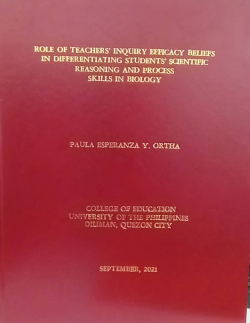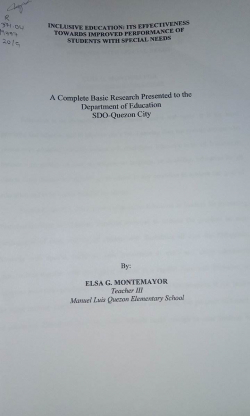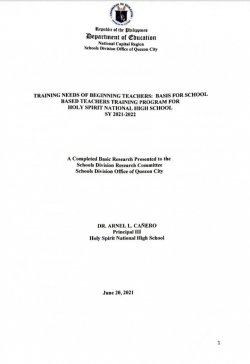Role of teachers' inquiry efficacy beliefs in differentiating students' scientific reasoning and process skills in biology

Type
Thesis
Authors
Ortha ( Paula Esperanza Y. )
Category
Biology
[ Browse Items ]
Publication Year
2021
Pages
xviii, 188 pages.
Subject
Biology--study and teaching.
Abstract
This study aimed to determine the influence of the components of Science Teachers' Inquiry Efficacy Beliefs (TIEB) on the components of students' scientific reasoning and process skills in Biology. It also tried to find out the relationship of the components of students' scientific reasoning and process skills in Biology.
A survey was conducted among 56 grade 9 science teachers and 1,968 students from Quezon City and Manila. The self-efficacy beliefs in regard to teaching of science as inquiry (TSI) was administered among the science teachers to determine their inquiry efficacy beliefs. The Lawson's Classroom Test of Scientific Reasoning (LCTSR) and the Science Process Skills Test (SPST) were administered to their students to assess scientific reasoning and process skills in Biology, respectively. Regression analyses conveyed teachers' belief that their students' skill in identification and control of variables in scientific reasoning. Linear relationship for the rest of the components of TIEB and students' scientific reasoning, and between TIEB components and students' process skills in Biology were not established.
Teachers were found to have high degree of inquiry efficacy beliefs. Their high degree of self-efficacy may be a coping mechanism to prevent burnout. On the other hand, Pearson product-moment correlation of students' scientific reasoning and process skills in Biology affirmed positive correlation. Furthermore, positive correlations were found between the components of scientific reasoning and process skills in Biology affirmed positive correlation. Furthermore, positive correlation were found between the components of scientific reasoning and process skills in Biology, though very weak.
These were between conservation of weight and volume and all the components of process skilss in biology, identification and control of variables and all the components of process skills in Biology, identification and control of variables and all the components of process skills in Biology, probabilistic thinking and all the components of process skills in Biology; correlation of proportional thinking and inferring; and correlation of correlational thinking and interpreting data. Student scientific reasoning and process skills in Biology influence each other bidirectionally. Components of scientific reasoning that were likewise found to predict components of process skills in Biology, and vice-versa were conservation skill, identification and control of variables, and probabilistic thinking. It was also found that proportional thinking and inferring skills may predict each other.
Barriers that hinder successful implementation such as time constraints, huge class size, and lack of resources were discussed. Furthermore, data communicated that generally, students have poor abilities in scientific reasoning and process skills in Biology.
It is recommended that teachers be involved in research to bridge the gap between their efficacy beliefs and their students' performance and that the study be replicated focused on qualitative observations.
A survey was conducted among 56 grade 9 science teachers and 1,968 students from Quezon City and Manila. The self-efficacy beliefs in regard to teaching of science as inquiry (TSI) was administered among the science teachers to determine their inquiry efficacy beliefs. The Lawson's Classroom Test of Scientific Reasoning (LCTSR) and the Science Process Skills Test (SPST) were administered to their students to assess scientific reasoning and process skills in Biology, respectively. Regression analyses conveyed teachers' belief that their students' skill in identification and control of variables in scientific reasoning. Linear relationship for the rest of the components of TIEB and students' scientific reasoning, and between TIEB components and students' process skills in Biology were not established.
Teachers were found to have high degree of inquiry efficacy beliefs. Their high degree of self-efficacy may be a coping mechanism to prevent burnout. On the other hand, Pearson product-moment correlation of students' scientific reasoning and process skills in Biology affirmed positive correlation. Furthermore, positive correlations were found between the components of scientific reasoning and process skills in Biology affirmed positive correlation. Furthermore, positive correlation were found between the components of scientific reasoning and process skills in Biology, though very weak.
These were between conservation of weight and volume and all the components of process skilss in biology, identification and control of variables and all the components of process skills in Biology, identification and control of variables and all the components of process skills in Biology, probabilistic thinking and all the components of process skills in Biology; correlation of proportional thinking and inferring; and correlation of correlational thinking and interpreting data. Student scientific reasoning and process skills in Biology influence each other bidirectionally. Components of scientific reasoning that were likewise found to predict components of process skills in Biology, and vice-versa were conservation skill, identification and control of variables, and probabilistic thinking. It was also found that proportional thinking and inferring skills may predict each other.
Barriers that hinder successful implementation such as time constraints, huge class size, and lack of resources were discussed. Furthermore, data communicated that generally, students have poor abilities in scientific reasoning and process skills in Biology.
It is recommended that teachers be involved in research to bridge the gap between their efficacy beliefs and their students' performance and that the study be replicated focused on qualitative observations.
Description
xviii, 188 pages: portrait ; 21 cm x 29.7 cm.
Thesis : (Master of Arts in Education, Biology Education) - University of the Philippines, 2021.
Thesis : (Master of Arts in Education, Biology Education) - University of the Philippines, 2021.
Number of Copies
1
| Library | Accession No | Call No | Copy No | Edition | Location | Availability |
|---|---|---|---|---|---|---|
| Learning Resource Management Section Library | 620 | T 570.7 Or77 2021 | 1 | Yes |



